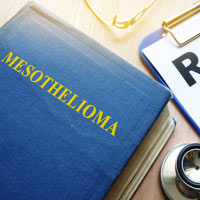 Those at risk of malignant mesothelioma from asbestos exposure may soon have a new diagnostic option through the efforts of researchers in Japan. Currently, testing for mesothelioma is not foolproof, and in most cases is only confirmed after the onset of physical symptoms – at which point treatment is likely to be less effective. Accurately diagnosing mesothelioma presently relies on a combination of medical testing and imaging, including specific blood tests that are also not fully reliable.
Those at risk of malignant mesothelioma from asbestos exposure may soon have a new diagnostic option through the efforts of researchers in Japan. Currently, testing for mesothelioma is not foolproof, and in most cases is only confirmed after the onset of physical symptoms – at which point treatment is likely to be less effective. Accurately diagnosing mesothelioma presently relies on a combination of medical testing and imaging, including specific blood tests that are also not fully reliable.
The Japanese research team has now developed an advanced form of testing that, if confirmed, may hasten diagnosis and help victims get treatment sooner – when it matters most.
Blood tests used to diagnose many types of cancers detect biomarkers, which are molecules in the bloodstream. They include antibodies which indicate that the system is fighting off disease, along with various proteins in the blood. These biomarkers indicate the presence of different conditions or diseases, but until now have not been 100 percent reliable for finding the presence of mesothelioma.
With mesothelioma, the current state of testing often includes a number of different biomarker tests, which in combination may provide a diagnosis. Japanese researchers have now developed a system that has shown better results in detecting a specific protein that indicates mesothelioma, called podoplanin. The presence of mesothelioma is indicated by higher levels of various diverse proteins in the blood, but until now no single test has been a foolproof tool.
Biomarker testing offers the potential to determine a diagnosis earlier, and then monitor the patient for progression and that addition of appropriate treatments.
For those who are seeking treatment for mesothelioma, the advice of an experienced Philadelphia asbestos lawyer can help you understand your options and how to get necessary compensation for your illness.
The SMRP biomarker is a type of protein that cancer produces, which is usually elevated in mesothelioma patients. However, not all patients with mesothelioma will show SMRP elevations in the blood test, which is one of the challenges of the disease.
Another biomarker, known as the protein fibulin-3, is also elevated in mesothelioma cancer. One newer study has shown that testing for this protein was more than 96 percent accurate in screening for mesothelioma; but additional research studies are needed to confirm the early results.
Osteopontin and MPF are two other biomarkers that are both higher in patients with several types of cancers, of which mesothelioma is one. They are also higher than the normal range in patients with other cancers, making testing of these biomarkers one part of an overall diagnostic process. With patients who have had occupational or home exposure to asbestos they can prove useful.
Treatment of mesothelioma may consist of radiation, surgery, and chemotherapy, as well as promising new trials in immunotherapy and virotherapy. Though there remains no cure for mesothelioma, the outcomes are improving for patients. But as with the majority of serious diseases, early detection provides the best hope for treatment.
The Philadelphia mesothelioma lawyers at Brookman, Rosenberg, Brown & Sandler have been getting results since 1984 for those who have been sickened by exposure to asbestos. Contact us to evaluate your case by calling 215-569-4000 or by completing our online form. We serve clients in Philadelphia, Delaware County, Chester County, Philadelphia County, Pennsylvania, and New Jersey.